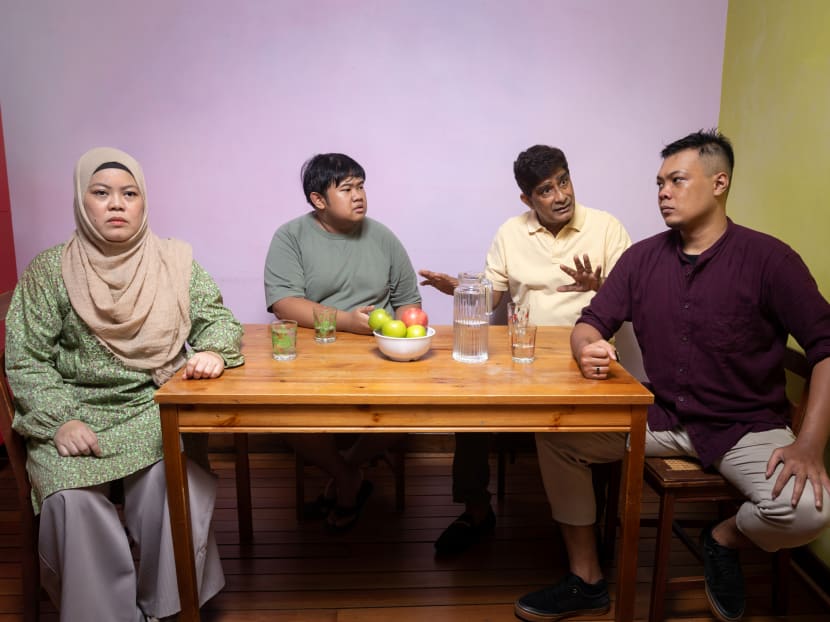Arts group to engage Malay community in talking about death via upcoming stage production
SINGAPORE — Issues surrounding death can be specific to a culture and it can be hard to talk about the end of life, as a team found out while examining this subject through an arts project called “Both Sides, Now”.

In a staged production titled Kata-Kata Kita, family members have to face the challenges of caring for an ailing father. The cast from left to right: Ms Dalifah Shahril, Mr Izzul Irfan, Mr R Chandran and Mr Farez Najid.
SINGAPORE — Issues surrounding death can be specific to a culture and it can be hard to talk about the end of life, as a team found out while examining this subject through an arts project called “Both Sides, Now”.
The project seeks to encourage the wider community here to explore what it means to live — and leave — well.
Over the past one-and-a-half years, it has focused on the Malay-Muslim community to create a space through workshops for people to open up about their wishes and challenges when facing death.
Next month, it will hold a staged production consisting of a radio show, panel discussion and more, to continue engaging the public.
Both Sides, Now had its beginnings in 2013 as a community engagement project at Khoo Teck Puat Hospital that uses various forms of art to provoke end-of-life conversations among the public.
It has had two other runs at various void decks of public housing blocks and at senior centres.
Mr Kok Heng Leun, 55, who has been part of the project team for the past seven years, remembered once putting up a puppetry performance as part of the project, telling the story in Malay of an elderly man confronting his fear of dying.
After the show, he approached an audience member and she talked about her close relative who, like the character in the show, died of cancer.
Although the woman was inquisitive about matters surrounding death, her husband interjected to run through the customs and beliefs of what end of life means as taught by their religion, thereby ending the post-show conversation.
Mr Kok said: “There’s always this perception that for Muslims, since religion is so much an important part of life... death is something that gets talked about a lot and that maybe, they’re more prepared there than other people.
“But it was really through all these encounters where I realised that maybe, that is not so.”
Dr Ad Maulod, the lead adviser of the project’s research team, did some ground work later and found something worth exploring.
In Muslim belief, for example, a deceased should be buried as soon as possible, preferably within 24 hours from death.
Dr Ad said that this means the burial process happens very quickly and people feel removed from the process of grieving for loved ones.
“That was what I found was prominent," added Dr Ad, who is a senior research fellow at the Duke-NUS Medical School’s Centre for Ageing, Research and Education.
“There was a lack of space to articulate loss, and that’s something that’s affecting the younger members and the sandwiched group of the Malay-Muslim community (who have to care for both young children and older parents).”
To prepare for its latest project called Both Sides, Now: Mengukir Harapan (meaning “carving hope” in Malay), the team conducted interviews with experts from various fields.
It also held seven workshops with Malays of various age groups and backgrounds to gather their perspectives on end-of-life issues.
What the team realised, Mr Kok said, was that there were many questions raised during these interviews and workshops.
For example: Who takes care of a sick family member? Who makes the decisions after someone dies? How do I grieve?
That research formed the backbone of the upcoming stage production called Kata-Kata Kita, meaning “Our Words”.
It will be held over three evenings from Nov 5 to 7 at the Aliwal Arts Centre.
The show, which will be free, will be presented by theatre company Drama Box and ArtsWok Collaborative, an arts-based community development organisation.
It will be staged in both English and Malay, and streamed live on bothsidesnow.sg.
The programme will take the form of a variety show.
There will be a radio segment where members of the public may write letters to their departed loved ones and a radio deejay reads them out.
Another segment will feature improvisational sketches where two actors act out the common faux pas friends or family members commit after someone dies.
A three-part theatre performance will also be staged, in a style reminiscent of long-running TV serials, covering the lives of three siblings who unexpectedly lost their mother years ago and now have to care for their ailing father.
Beyond broaching the subject of grief, the show will also touch on topics such as planning for future health and personal care as well as faraidh, the Islamic law on inheritance.
A panel discussion will be held at the end of each show with experts from law, palliative care and social work speaking more about these issues.
For Ms Moli Mohter, 44, an actress taking part in the show, even she has trouble bringing up end-of-life topics with her parents.
“It’s, like, how do I start talking to them about this? My parents might think that I’m trying to go after, what, their gold?
“We want people to have this opportunity when they watch (the performance) and think, ‘Our family might have these same problems and, you know, maybe we should talk about it’,” she said.
CORRECTION: An earlier version of this article misspelt the name of Dr Ad Maulod. We apologise for the error.











